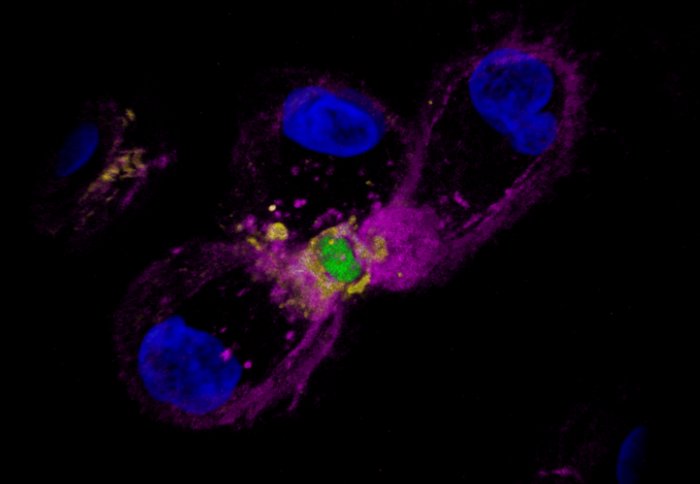New research uncovers mechanism behind deadly infections in transplant patients

Aspergillus fumigatus is harmless to most people but can cause a fatal infection in transplant patients, a recent study has discovered why.
Aspergillus fumigatus can cause a fatal infection in transplant patients that they are unable to fight off. This mould is all around us in the environment and its spores are inhaled by all of us on a daily basis. So why is it that transplant patients are the ones at risk? A recent study by Dr Darius Armstrong-James of the NHLI looked at the mechanism behind this lethal infection to uncover why it is so problematic to transplant recipients.
Our next steps will be to determine the impact of cooperative macrophage transfer in the lung on whole-organ control of infection
– Dr Darius Armstrong-James
Normally macrophages in the lung kill Aspergillus fumigatus, stopping subsequent infections. It was decided that it was important to understand the mechanisms of the initial infection by Aspergillus fumigatus to see how this varies in an immunocompromised host, so we can understand the problem posed to transplant recipients. Transplant patients are given drugs to prevent the rejection of newly transplanted organs by their own immune system, this research focused on transplant recipients from Harefield Hospital on calcineurin inhibitor immunosuppressants, which reduce the production of calcineurin.
The researchers found that macrophages are able to pass fungal pathogens such as aspergillus fumigatus between each other by an endocytic process during cell death. It was found that calcineurin is a major regulator of the macrophage cell death response to Aspergillus fumigatus during productive infection. Critically, macrophage cell death enabled cell-cell transfer of germinating Aspergillus fumigatus spores, leading to control of germination in recipient macrophages. The lower levels of calcineurin in patients on immunosuppressant drugs meant they were less able to carry out this process and thus control the spread of the mould infection. The study also found that the cell-cell transfer events were also calcineurin dependent.
These studies show for the first time that macrophages in the lung are able to cooperate to control the germination of the common mould Aspergillus fumigatus, and that this process is likely to be severely impaired in transplant patients taking calcineurin inhibitor drugs. This helps to explain why they are at high risk of fungal disease. The findings are also of more fundamental interest to researchers interested in myeloid immunity, as this kind of host-mediated cell death-dependent cooperative behaviour during infection has not been previously described. There are also important implications for transplant immunity more generally, as macrophage scavenging of dead cells in the lung is likely to rely on similar mechanisms.
This is the first time cell death associated pathogen transfer has been shown for any pathogen, with important implications for fungal disease of the lung and for spread of fungal pathogens in the body. A better understanding of the mechanisms behind the spread of infections such as Aspergillus fumigatus can help us safeguard against lethal infections in transplant patients, develop new drugs and we can use this new knowledge to advance similar areas of healthcare.
Asked what is the next line of investigation in this area for his team Dr Armstrong-James commented “Our next steps will be to determine the impact of cooperative macrophage transfer in the lung on whole-organ control of infection, which we are currently approaching using innovative in vivo visualisation techniques in collaboration with Leo Carlin. In addition we aim to further characterise the precise form of macrophage cell death that is induced by fungi. Ultimately our aim is to develop novel drugs that modulate macrophage cell death in fungal infection, because we believe this may be the key to ameliorating the hyperinflammatory response seen in Aspergillus-associated lung disease”.
Article supporters
Article text (excluding photos or graphics) © Imperial College London.
Photos and graphics subject to third party copyright used with permission or © Imperial College London.
Reporter
Ms Helen Johnson
Communications Division